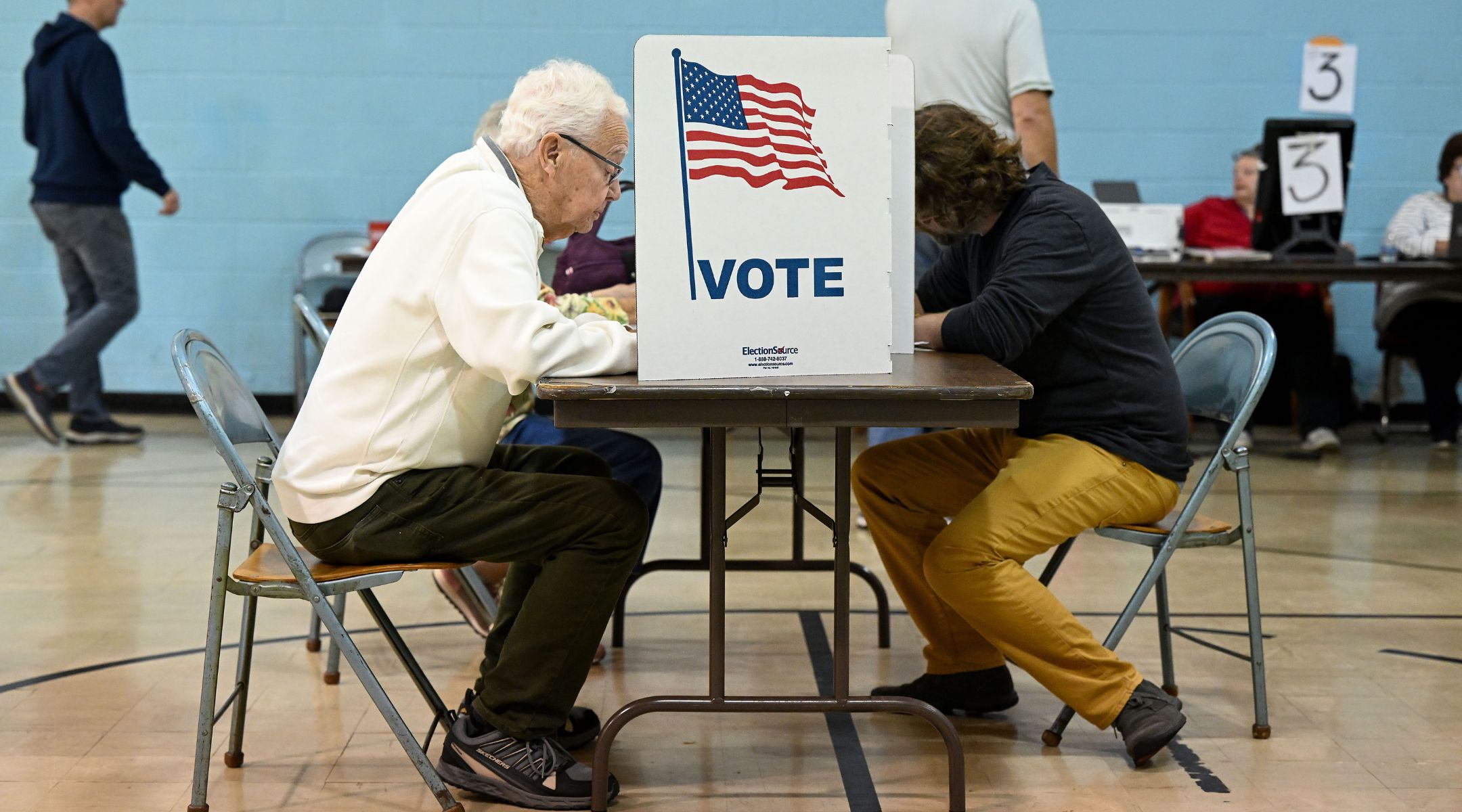The surefire way for Jews to lose this election
Forget Harris and Trump; here are the real stakes on Tuesday

Voters fill out their ballots at a polling station in Grand Rapids, Michigan, Oct. 29. Photo by Joshua Lott/The Washington Post via Getty Images
It’s likely too late to change a single American Jewish vote. But it’s not too late to change how we behave after we vote.
I believe Vice President Kamala Harris is the best choice for the United States, American Jews and Israel, but I understand not everyone agrees with me, and this election is a coin toss inside a tumble dryer. Who wins is not in any one of our hands. How we handle our team’s victory or loss is exactly what we can control.
And controlling that is essential for the continuation of American democracy, and for American Jewry. The ability for American Jews, or any minority, to grow and thrive doesn’t depend on the success of any single party. It depends on the health of democracy itself, which protects individual and minority rights and safeguards religious freedom and free expression.
What that means, practically, is standing up to the election deniers on your own side. We know for a virtual certainty that there are factions that will do their utmost to cast doubt on any result that doesn’t go their way. It’s essential that each of us commits ourselves to fighting back.
Where democracy ebbs, extremism flows. We can see that happening now in India, Hungary and yes, Israel, where right-wing forces are attacking minority rights and nonviolent dissent. But it is not solely a phenomenon of the right. In Venezuela and Nicaragua, left-wing autocrats have persecuted the opposition in pursuit of the goal of cementing one-party rule.
What these cautionary tales all have in common is the collapse of free and fair elections.
“Elections are far from the sum total of a healthy democracy,” Aaron Dorfman, executive director of A More Perfect Union, wrote in 2022. “but democracies cannot function without them.”
It’s true: All the ways we participate in shaping our collective future are rooted in the vote. We Jews have every right, even a responsibility, to advocate for our side. But after the polls close, we need to become defenders of the electoral process, partisans for democracy itself.
Yes, we need to make certain election officials fairly count every vote, and any election fraud is called out. (It bears repeating that legitimate instances of voter fraud are, in recent history, vanishingly rare.) But we have to resist the urge to delegitimize or undermine the result. Doing so trades the possibility of a short-term gain for long-term damage to the system that has enabled Jews to be safe, secure and successful.
For a good example of what not to do, listen to or read the debate last week between Sam Harris and Ben Shapiro hosted by The Free Press.
Harris said that former President Donald Trump’s refusal to accept the results of the 2020 election, and the Jan. 6 riot that his rejection of that outcome instigated, made it impossible to consider voting for Trump, even though he isn’t sold on Vice President Kamala Harris, or the priorities of the left.
“The spectacle of a sitting president refusing to commit to a peaceful transfer of power, culminating in an attack on the Capitol, remains the most shocking violation of political norms to occur in my lifetime,” Harris said.
Shapiro responded in precisely the way that I hope, or pray, no Jewish Trump voter reacts after Nov. 5. He equivocated. He obfuscated. He used his considerable intellect to rationalize an attack on democracy.
“The argument that Donald Trump was making between November and January was morally and legally specious,” Shapiro said of Trump’s outright lies regarding the election. “With that said, there was a peaceful transition of power.” And yes, President Joe Biden, was inaugurated on Jan. 20, 2021, as scheduled.
What Shapiro chose to ignore was that Jan. 20 was only peaceful because law enforcement was able to quash a riot that brought an army of white supremacists inside the halls of Congress, resulting in several deaths.
Shapiro isn’t the only Jewish Republican who refused to stand against a party leader who undermined democracy. In Newsweek, commentator Jonathan Tobin took the same what’s-the-big-deal approach to Jan. 6, accusing Democrats of fomenting a “big lie” that the rioters were treasonous. His argument would make more sense if many of the Jan. 6 rioters hadn’t, in fact, pleaded guilty to seditious conspiracy.
“But what about Hillary and the Russians?” is the common counterargument Shapiro and others offer when confronted with their own acquiescence to Jan. 6. Following Trump’s 2016 election, Democrats accused him of benefitting from Russian election interference. Those charges were investigated and adjudicated, but Hillary Clinton conceded the election within 24 hours. That’s the crucial difference. You can have questions about how an election was conducted; to decry it as illegitimate just because you’re unhappy with the result is a different thing entirely.
Shapiro, Tobin and other Jan. 6 apologists refuse to see that day for the ongoing threat it poses to American democracy, though other Republicans courageously stood up to the party faithful.
“Wednesday was the day of Broken Glass right here in the United States,” former California Governor Arnold Schwarzenegger said in a video following Jan. 6, referring to Kristallnacht, the Nazi pogrom against Jews which took place across Germany on Nov. 9, 1938. “The broken glass was in the windows of the United States Capitol.”
The days following Nov. 5 will require that sort of courage: One party — we don’t yet know who — will need to admit defeat. The rest of us will need to speak out against any side that seeks to undermine the vote. To defend democracy, win or lose.

















